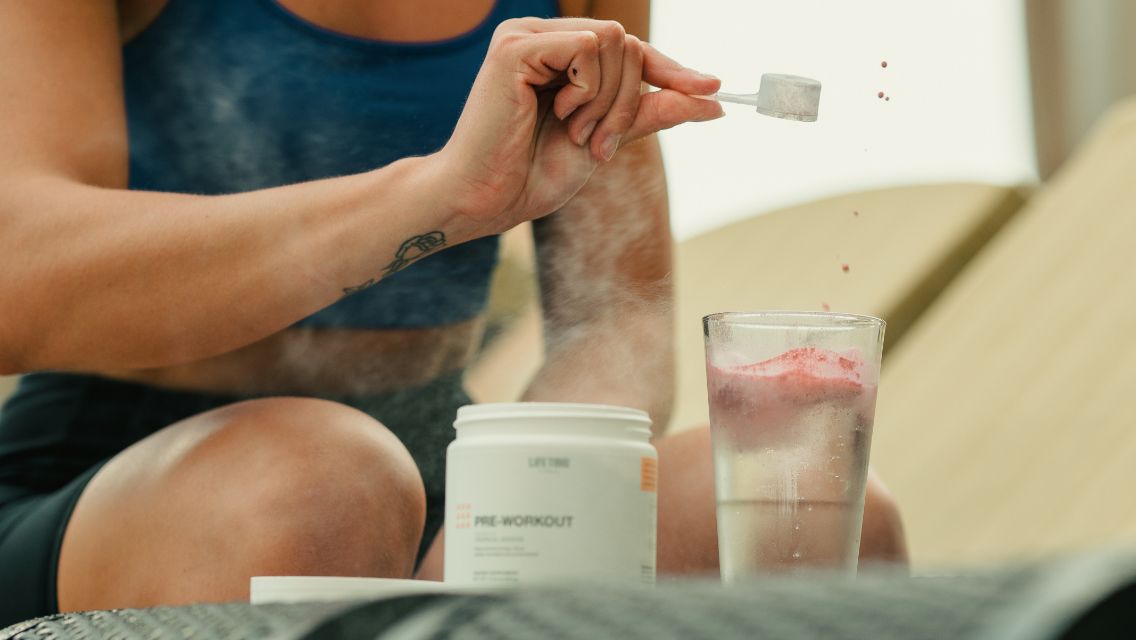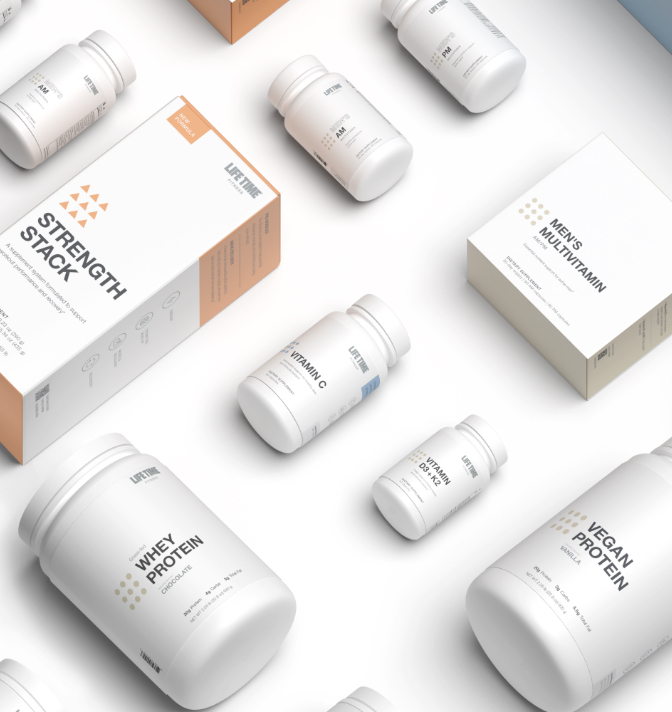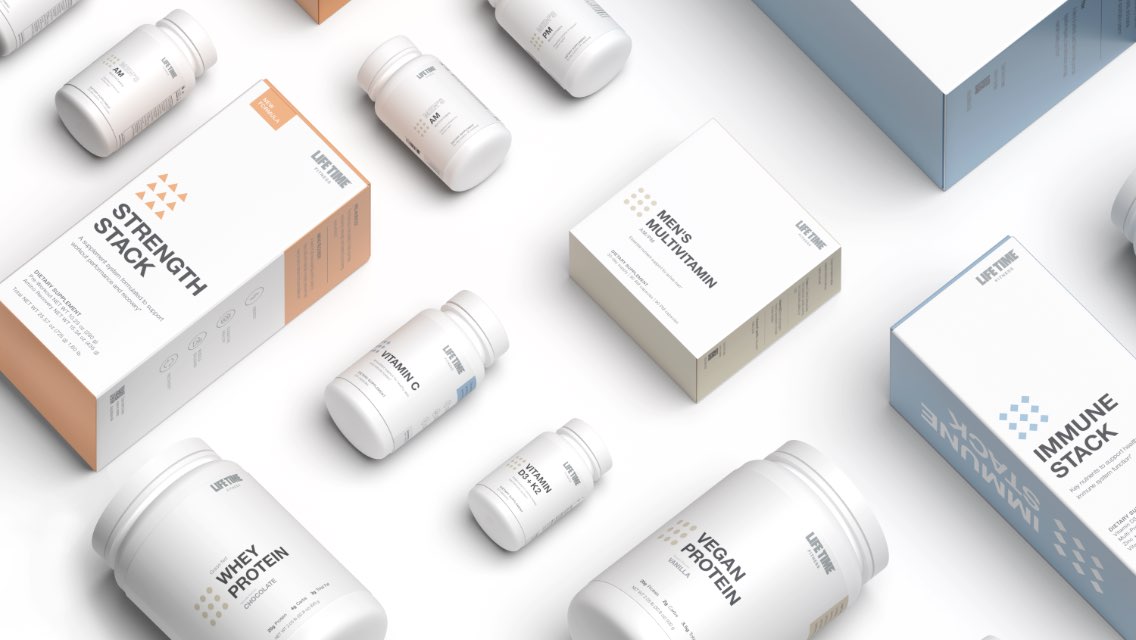Most know the importance of fueling properly for our workouts. If we’re not, the way we feel and our progress can both be compromised — you might have less energy, fatigue quicker, or injure easier. Because optimal strategies differ person to person and are dependent on your body and goals, this area of nutrition can be confusing for many. (For more, read “A Simplified Guide to Pre- and Post-Workout Nutrition.”)
However, one tool we commonly get asked about by clients is a pre-workout supplement. What I often say is that if you’re already on point with your pre-workout nutrition, sleep, and recovery, but are wanting a little extra boost of energy for your workouts, then supplementing with pre-workout powder may be a good option for you.
For a little more insight, below are some frequently-asked questions I get from clients around pre-workout supplementation — and my answers to them.
Who could benefit from using a pre-workout supplement?
If you’re feeling fatigued, following a calorie deficit, lacking focus or motivation, or don’t feel you’re performing as well as you’d like, then supplementing with a pre-workout may be a helpful option for you.
I love recommending pre-workout supplementation to clients who really want to enhance their strength-training workouts, improve their endurance, or maximize their results.
What are the pros of using a pre-workout supplement?
Pre-workout can improve your energy, performance, and focus during your workouts. It can also support healthy blood flow and help build your workout capacity and tolerance. Read on below to see which ingredients are responsible for delivering these benefits.
How do you use a pre-workout powder?
I recommend using pre-workout roughly 30 minutes prior to a strength-training workout or other types of higher-endurance activities when you want to increase your performance.
I would suggest starting with one scoop (a half serving) of powder with 8 to 10 ounces of water if you’re newer to using pre-workout supplementation and/or if you have a lower tolerance to caffeine or certain vitamins or minerals. You can always add more water or powder if needed once you see how your body responds to it.
Our Life Time Pre-Workout comes in Tropical Breeze and new Dark Cherry flavors, which makes them taste great when mixed with water.
For best results, aim to use a pre-workout at least four days a week for one month or longer. Beta-alanine (an ingredient in pre-workout) requires consistent use to build up carnosine levels in the muscle cells. So, using it any less than that won’t allow it to accumulate correctly to give you the best results.
How does supplementing with pre-workout compare to using food only?
Pre-workout doesn’t provide many calories, measuring at only five to 10 calories per serving. However, it does deliver a handful of nutrients and other bioactive ingredients that help the body access stored energy, dilate blood vessels, and stimulate the nervous system to recruit muscle fibers, as well as support motivation and focus. It energizes you!
Eating food before a workout provides energy as calories (and variable amounts of vitamins and minerals, depending on what you eat). Digesting and absorbing energy and nutrients from food likely takes longer compared to a pre-workout powder, and the body will preferably burn the calories from the recent food intake before dipping into fat stores. Thus, if you like to have energy to work out, and prefer to allow your body to maximize the use of stored energy, a low-calorie, nutrient-enhanced pre-workout may suit you well.
Depending on your training goals and demands, it’s possible you’ll need food and pre-workout to optimize your performance.
I like to recommend 20 to 40 grams of protein or >6 grams of essential amino acids plus 20 to 45 grams of steady carbohydrates for energy two to three hours before a workout for most adults. However, also including pre-workout supplementation around 30 minutes prior to your workout can help enhance your workout since it typically includes caffeine and certain vitamins and minerals (see the list of those below).
What ingredients are included in Life Time’s Pre-Workout — and what do they do?
Vitamins B6 and B12 to support energy and mitochondrial ATP production. These B vitamins are critical co-factors for the energy production we rely on to exercise.
L-Citrulline malate to support nitric oxide production and reduce lactic acid accumulation. L-Citrulline helps open your blood vessels to deliver blood and nutrients to working muscles.
CarnoSyn® beta-alanine to elevate muscle carnosine levels, buffer lactate, and improve high-intensity exercise tolerance. It helps you work harder for longer without getting as fatigued when used consistently for three-plus weeks.
RedNite® beet juice powder to help increase exercise performance and tolerance, boost stamina, and maintain brain and cardiovascular health.
Citicoline choline to support cognition, focus, drive, motor skill acquisition, and a positive mood. It’s food for the brain and neurons.
N-Acetyl-L-Cysteine to help extend the activity of nitric oxide and maintain healthy glutathione levels. This helps build and maintain resilience in your blood vessels and the rest of your body.
Caffeine to improve focus, exercise capacity, power output, and fat metabolism, and decrease pain sensation.
L-theanine to promote a stable, focused mindset, and minimize potential “jitters” from caffeine.
DMAE bitartrate, a precursor to the neurotransmitter acetylcholine, to potentially help promote cognitive function and help protect neurons from excessive oxidative stress.
What ingredients should you avoid in a pre-workout supplement?
Artificial sweeteners, sugar, and sugar alcohols should be avoided as they can add unwanted calories or cause intestinal distress. Life Time’s Pre-Workout does not contain these.
Are there any cons to using a pre-workout supplement?
Some people may feel temporary paresthesia (a harmless but sometimes irritating pins and needles sensation on the skin) from the beta-alanine. However, over time, this sensation should fade with consistent use.
Before taking any supplement, we always recommend checking with your doctor first, especially if you have any known medical conditions (physical or psychological) or take medications. In addition, we recommend ensuring your pre-workout supplementation has been third-party tested and is GMP certified.





